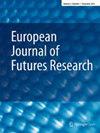2020年计划:技术和教育的未来情景——乌拉圭公共教育系统的案例
IF 3.7
3区 社会学
Q1 SOCIAL SCIENCES, INTERDISCIPLINARY
引用次数: 14
摘要
本文章由计算机程序翻译,如有差异,请以英文原文为准。
Plan Ceibal 2020: future scenarios for technology and education—the case of the Uruguayan public education system
求助全文
通过发布文献求助,成功后即可免费获取论文全文。
去求助
来源期刊

European Journal of Futures Research
SOCIAL SCIENCES, INTERDISCIPLINARY-
CiteScore
4.60
自引率
9.10%
发文量
23
审稿时长
14 weeks
期刊介绍:
There is a significant need for European futures research as European countries face numerous substantial problems; at the same time they seek to make a contribution to solving global challenges. European regions “share” common experiences, divisions and conflicts – which altogether build a rich resource for critical examination as well as forward-looking renewal. European integration after World War II has reshaped political, economic and social relations in Europe and beyond. Therefore, the future of Europe will also depend on the further development of the European Union in its wider transnational and global contexts. Consequently, the journal seeks to foster thorough analysis of key European policies, such as those for research and education. Nonetheless, topics addressed in the journal are not limited to the (development of the) European Union; we invite articles that raise questions about European futures more generally. Interdisciplinary research is as welcome as are disciplinary studies, ranging from the social sciences and humanities to the natural sciences and engineering.
 求助内容:
求助内容: 应助结果提醒方式:
应助结果提醒方式:


